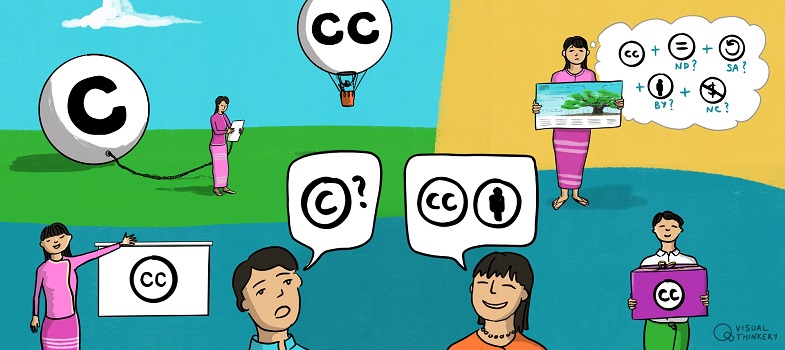Creative Commons licences
CC legal tools are an alternative for creators who choose to share their works with the public under more permissive terms than the default ‘all rights reserved’ approach under copyright. The legal tools are integrated into user-generated content platforms like YouTube, Flickr and Jamendo, and they are used by non-profit open projects like Wikipedia and OpenStax. They are used by formal institutions like the Metropolitan Museum of Art and the British Library, and individual creators. We will find out more about the different CC licences and how to look for different types of CC-licensed resources in Units 3 and 4.
In addition to giving creators more choices for how to share their work, CC legal tools serve important policy goals in fields like scholarly publishing and education. Watch the video ‘Why open education matters’ to get a sense for the opportunities that Creative Commons licences create for education. Collectively, the legal tools help create a global commons of diverse types of content, from picture storybooks to comics, that is freely available for anyone to use.
CC licences may additionally serve a non-copyright function. In communities of shared practices, the licences act to signal a set of values and a different way of operating.
For some users, this means looking back to the economic model of the commons. As economist David Bollier describes it, ‘a commons arises whenever a given community decides it wishes to manage a resource in a collective manner, with special regard for equitable access, use and sustainability.’ Wikipedia is a good example of a commons-based community around CC-licensed content. You can find out more about the commons in the additional resources section.
For others, the CC legal tools and their buttons express an affinity for a set of core values. CC buttons have become ubiquitous symbols for sharing, openness, and human collaboration. The CC logo and icons are now part of the permanent design collection at the Museum of Modern Art (MoMA) in New York City.
While there is no single motivation for using CC licences, there is a basic sense that CC licensing is rooted in a fundamental belief that knowledge and creativity are building blocks of our culture rather than simple commodities from which to extract market value. The licences reflect a belief that everyone has something to contribute, and that no one can own our shared culture. Fundamentally, they reflect a belief in the promise of sharing.
Introduction
